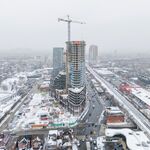I think dedicated taxes for transit expansion/operation (like the conversation Metrolinx was driving back in 2016 about how to pay for the Big Move) are a great idea.
They would preferably meet these 3 criteria:
- Be easy to collect
- Raise significant revenue
- Incentivize positive outcomes
Based on that, I think the answer would be:
1. Regional Vehicle Registration Tax
This would vary significantly based off of the emissions, safety, and size of the vehicle.
- EVs don't have any local emissions, so they would pay very little. Diesel vehicles produce lots of PM2.5 pollution (huge cause of death) so they would pay a lot
- Smart fourtwo's, sedans, and vehicles which are unlikely to kill vulnerable road users would pay very little. Massive trucks with bullbars at pedestrian head height and with large blind spots would pay significantly more
- Wear and tear on roads is proportional to the cube of vehicle axel loading, so light cars would again pay much less than heavy trucks.
The minimum yearly vehicle registration tax at the lowest rate would be the same as when Rob Ford cancelled it (~$80). This would help combat the dangerous vehicle arms-race trend of larger and larger vehicles.
This could raise $700 million/year.
2. Gas Tax Increase
Revenues from gas taxes have been declining due to more fuel-efficient vehicles, and the
gas tax itself hasn't been raised since the Blue Jays won the world series, so it's about time to increase it. Although with the Supreme Court ruling (showing unfortunately consistent disdain for the constitution because reasons) and the carbon tax coming into place, it looks like it will rise regardless.
This kind of tax is great for increasing the cost of car trips and incentivizing public transit use (or HOV use.)
5 cents/Litre increase (bringing us on par with Quebec)
would raise $300 million/year.
3. Land Value Tax
Even as a revenue-neutral option, the province should switch municipalities from being Property Value based to being Land Value based (or most likely a blended system.)
Land Value Tax is based off of the "highest and best" use of a plot of land. Which means that:
- Speculators sitting on an underused lot pay tax as though it were fully developed
- Property owners aren't penalized for improving or densifying their properties
American cities that use this tax are much more walkable and livable than cities that don't. They also tend to have fewer downtown parking spaces.
I'm proposing that the taxes are at a constant mil rate, so that the city is able to recover some of the land value uplift that comes from transit construction.
4. Parking Levy
The single greatest lever that the city/province has at its disposal to encourage public transit over driving is with parking policy.
Our current policy is for socialized parking. Government provides subsidized oversupplies of parking (through free parking on roads competing with private garages, parking minimums, FSI maximums) and then acts surprised that people are driving so much. Ending parking minimums province-wide is the bare minimum (at zero cost) that any provincial government should do.
Metrolinx estimated a $0.25 / parking space/day levy
would raise $350 million/year.
5. Toll for Municipal highways
It's unfortunate that the Province can download highways onto Toronto but Toronto doesn't have the right to toll them to maintain them. Given that the city is spending
44% of its capital budget just to rebuild the Gardiner, it's reasonable to expect users of the Gardiner to pay for its reconstruction with tolls. This would free up $2.2 billion for public transit.
Tolling other limited-access highways, like the 401, would be a good thing but would be a harder sell.
6. Charge for GO Parking
This is a drop in the bucket compared to other things, but it's something that should be instituted regardless.
It's perverse that it costs $8 round trip to take a bus to the GO station, but parking is free. Given that it costs $50k per parking space to build a parking garage (and ongoing costs to maintain it), that means that transit users are subsidizing wealthier people who drive to the stations.
It's gotten so bad that Metrolinx is now
one of North America's largest providers of parking. We have a parking agency that also sometimes runs trains. Charging for parking will let them reduce their dependence on Park n Rides and free up land for more productive, revenue-generating uses.
Charging $3/day for parking would raise $25 million/year. The shift in local access station to other modes would also allow Metrolinx to save the $100 million/year it spend on parking garage construction.
Charge for parking and reduce GO fares by a similar amount to the increase. Oh, and have local transit operator fares go towards the price of your GO fare.
I guess that’s true that you could use the odometer. As long as no one finds a way around it. In Holland years ago they had insurance that was connected to gps offering rates lower based on when you drive (less cars on the road sometimes) and how fast you drive. (Fast or slow). But it never got traction because of privacy issues. As long as I walk around with a cell phone I don’t really believe I have any privacy. But that’s just me so I’d appreciate the cheaper insurance but if the odometer works that’s fine with me.
TD Auto Insurance already does that. There is an app always running in the background of my phone with GPS. It gives me a score based on how well it thinks I am driving (apparently I am too speedy but at least I am light on the brakes) and based on the driving score TD offers me a discount.
But the key difference is that I voluntarily signed on for it in exchange for a rebate.




